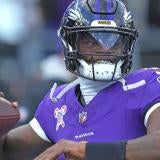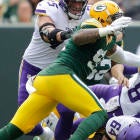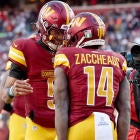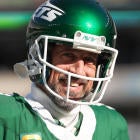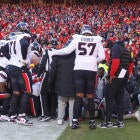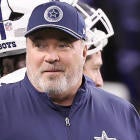The Minnesota Vikings did not beat the Green Bay Packers in an early, but key intra-division clash on Sunday, falling by a final score of 21-16. They did not win for a variety of reasons -- falling into a 21-0 hole in just over 15 minutes being one of them -- but the one reason that sticks out above the rest is quarterback Kirk Cousins, who submitted yet another dismal performance against a good team.
On Sunday, Cousins completed only 14 of his 32 pass attempts (43.8 percent) for 230 yards, one touchdown, two interceptions, and a 52.9 passer rating -- in addition to fumbling twice. On Wednesday, Cousins offered a brutally honest assessment of his performance, admitting that he won't be around long in Minnesota if he continues to play the way he did on Sunday.
Kirk Cousins said “I won’t be playing quarterback here much longer if I play the way I did Sunday”
— Chris Tomasson (@christomasson) September 18, 2019
Through the first two games of the season, Cousins has completed 52.4 percent of his passes and averaged 7.8 yards per attempt while throwing for two touchdowns, two interceptions, and a 74.3 passer rating. He's already fumbled four times. By DYAR, he ranks 30th -- one spot behind Mitchell Trubisky. By DVOA, he ranks 31st -- one spot ahead of Jameis Winston. And by QBR, he ranks 32nd, only ahead of Ryan Fitzpatrick.
So no, those numbers are not what the Vikings had in mind when they gave Cousins a three-year, $84 million fully guaranteed contract last offseason.
Highest percentage of uncatchable passes through two weeks:
— Steve Palazzolo (@PFF_Steve) September 16, 2019
Cam Newton 34.2%
Mitchell Trubisky 27.8
Ryan Fitzpatrick 27.3
Kirk Cousins 27.0
Kyler Murray 22.9
Matthew Stafford 22.9
NFC North quarterback grades (out of 34 qualifying QBs) from @PFF after two weeks:
— Joe Kipp (@JuhKipp) September 17, 2019
13. Aaron Rodgers
18. Matthew Stafford
32. Mitchell Trubisky
34. Kirk Cousins
There are only 32 teams.
Really, the contract is the Vikings' biggest problem. It's why Cousins will still be the Vikings quarterback for the foreseeable future. Even if Cousins continues to underwhelm, the Vikings are stuck with him through the 2020 season because of that deal, which is paying him $29 million this year and $31 million next year. They don't have a way out of that contract unless they find a way to trade him, but there's probably not another team out there that would be willing to give up draft capital for an expensive quarterback who isn't playing like one.
But it shouldn't be considered all doom and gloom in Minnesota. Despite Cousins' poor start to the season, they're 1-1. He's also only played one bad game this season. In a win over the Falcons in Week 1, he threw the ball only 10 times, as the Vikings relied almost exclusively on their ground game -- a strategy that worked.
Furthermore, through the first 18 games of the Cousins era in Minnesota, he has completed exactly 69 percent of his passes, averaged 257 passing yards per game, thrown 20 more touchdowns than interceptions (32 to 12), and accumulated a 98.1 passer rating. Those aren't bad numbers. They're pretty much in line with the statistics he posted in Washington as the Redskins' starter for three-plus seasons.
The problem is, Cousins and the Vikings can't seem to manage to win the big games. We saw it in Week 17 last year when they needed to beat the Bears, who had already clinched the NFC North, to make the playoffs, but got stomped by 14 points as Cousins averaged four yards per attempt and posted a 79.4 passer rating. And we saw the type of thing happen again on Sunday -- the kind of thing has unfortunately come to define Cousins, an otherwise good quarterback, to this point in his career.
Fair or not, Cousins won't be judged by his final stat line with the Vikings. He'll be judged by the amount of postseason success the Vikings see with him at quarterback. There's still plenty of time for Cousins to guide the Vikings deep into January and maybe even February, but to do so, the Vikings will need to start beating the Packers and Bears. Last year, Cousins and the Vikings went 1-2-1 against their NFC North rivals, which really would've been 1-3 if not for a questionable roughing the passer penalty that allowed the Vikings to tie the Packers in their first matchup.




